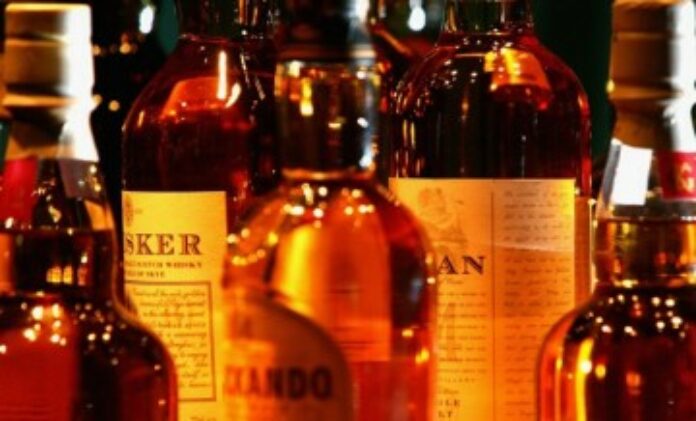Everyone loves a drink, including the DS staff, and it is to this end that we and many Britons are bemused by the Remain campaigners who are constantly putting Britain down.
The EU has made booze for Britons more expensive and not only that, restricted how our beverages companies can trade globally.
We should be selling our whisky to the world, instead the EU restricts British drinks companies from striking free trade deals with vitally important, lucrative markets.
If we Vote Leave and take back control then our drinks trade will prosper – something both drinkers and exporters can raise a glass to, and buying a round won’t mean you need to take out a second mortgage or sell the car.
600,000 jobs in the UK alcohol industry are NOT at risk if we Vote Leave.
-
These jobs depend on trade with countries in the EU, not on membership of the EU.
-
The Prime Minister has accepted that trade would go on if we Vote Leave: ‘If we were outside the EU altogether, we’d still be trading with all these European countries, of course we would… Of course the trading would go on. Sometimes … There’s a lot of scaremongering on all sides of this debate. Of course the trading would go on’ (The Andrew Marr Show, 6 January 2013, link).
We import more beverages from the EU than we sell to them. They will want to strike a free trade agreement.
-
In 2014, the UK exported £3.29 billion of beverages to the EU. The UK imported £5.26 billion of beverages from the EU (OECD, 2015, link; HMRC, 2015, link). The EU sold the UK £1.98 billion more in beverages than the UK sold the EU.
-
This means they are sure to want to negotiate a new deal to preserve access to the world’s fifth largest market. French winemakers and German brewers will still want to sell the UK alcohol if we Vote Leave.
The European Court has previously required the UK to increase the price of beer, putting jobs at risk.
-
On 12 July 1981, the European Court ruled that the UK’s low duty on beer ‘afford[ed] protection to domestic beer production’ and was therefore illegal under EU law (Commission v United Kingdom [1983] ECR 2265, link). In his 1984 budget statement, the Chancellor of the Exchequer, Nigel Lawson, said ‘we lost; and I am now implementing the judgment handed down by the court last year. Accordingly, I propose to increase the duty on beer by the minimum amount needed to comply with the judgment and maintain revenue: 2p on a typical pint of beer’ (HC Deb 13 March 1984, col. 302, link).
Being in the EU means we cannot strike a trade deals with India, harming exports of alcohol.
-
India charges an average tariff of 69.1% on beverages and tobacco, with the highest tariff of 150% on Scotch Whisky (IMF, 2016, link).
-
The EU has failed to strike a free trade deal with India.
-
The Chief Executive of the Scotch Whisky Association, David Frost, has said: ‘India is the biggest spirits market in the world and we have got 1 to 2 per cent of it. It is a difficult business environment. Everyone who does business there knows that (Scotsman, 7 December 2014, link).
The EU has been very bad at negotiating free trade deals compared to small countries.
-
The EU has concluded 37 trade agreements with 54 countries since 1970. In 2015, the aggregate GDP of all the countries with which the EU had a trade agreement in force was $7.7 trillion.
-
By contrast, the aggregate GDP of all countries with which Chile had trade agreements was $58.3 trillion. The figure for South Korea was $40.8 trillion and that for Switzerland was $39.8 trillion (albeit these all include the EU with a GDP of $16.7 trillion) (Civitas, January 2016, link).
The Head of the IN campaign has admitted trade deals with third countries could continue. There is no reason why any country would choose to deny itself access to the world’s fifth largest market.
-
The Executive Director of the IN campaign, Will Straw accepted that free trade agreements with third countries could continue after we Vote Leave, stating: ‘Either eventuality could come to pass, depending on what happened in that situation’ (Evidence to Treasury Committee, 2 March 2016, link).
-
The UK is the world’s fifth largest economy (World Bank, 2015, link). There is no reason why any of the countries with which the EU has a free trade deal would choose to cut off their exporters’ access to the world’s fifth largest market.
It is possible to negotiate a trade agreement (FTA) very quickly outside the EU, certainly in less than two years.
-
The US-Australia FTA was concluded in less than two years. Formal negotiations for a free trade agreement began in Canberra on 18 March 2003 (Library of Congress, 3 August 2003, link). The agreement came into effect on 1 January 2005 (Australian Government, 2016, link). The US Government states that ‘as a result of the U.S.-Australia Free Trade Agreement, tariffs that averaged 4.3 percent were eliminated on more than 99% of the tariff lines for U.S. manufactured goods exports to Australia’ (US Government, 2011, link).
-
Switzerland-China FTA was negotiated in just over two years. There were 9 rounds of negotiations between April 2011 and May 2013 which ‘produced a deal praised by both sides for its quality and its breadth, covering goods, services, investment, and competition (Centre for Security Studies, February 2014, link). The agreement entered into force on 1 July 2014 (Swiss State Secretariat for Economic Affairs, 2016, link).





